Staff Reporter
J.B. Hunt Progresses Toward Sustainability Goals

[Stay on top of transportation news: Get TTNews in your inbox.]
J.B. Hunt Transport Services has issued a report that provides a window into the company’s current energy usage and outlines a series of corporatewide sustainability goals it has adopted.
“J.B. Hunt understands the importance of providing additional information around environmental, social and corporate governance topics to help stakeholders appreciate how we are managing certain risk,” CEO John Roberts said in a statement. “In conjunction with that effort and based on feedback from many of our key stakeholders, J.B. Hunt is proud to have made available a report.”
The Aug. 7 report includes data for greenhouse gas emissions, air quality, driver working conditions and safety management for 2019, and also highlights long- and short-term strategies for reducing GHG emissions and improving driver health.

Roberts
The company notes that 1.3% of its current fuel usage is natural gas while 8% is renewable. It said it produced more than 1.8 million metric tons of CO2-e emissions in 2019 and plans to reduce metric tons of CO2-e per million for ton-miles by 3% going into 2025.
To help reach that target, the company will deploy a proprietary idle-reduction app for drivers and plans to convert its entire fleet to the automated manual transmissions by 2022. As of last year, 58% of J.B. Hunt’s fleet had AMTs, the report said.
The company also plans to convert at least 25% of its day cab and straight truck fleet to alternative power by 2035.
J.B. Hunt used a framework developed by the Sustainability Accounting Standards Board in creating its sustainability plan. The nonprofit develops sustainability accounting standards.

Transport Topics introduces its newest digital interview series, Newsmakers, aimed at helping leaders in trucking and freight transportation navigate turbulent times. Audience members will gain access to the industry's leading expert in their particular field and the thoughtful moderation of a Transport Topics journalist. Our second episode — "The Evolution of Electric Trucks" — featured Nikola founder and executive chairman Trevor Milton. To view the replay, complete this form.
Roberts noted that is one aspect of efforts by J.B. Hunt to be more transparent with environmental, social and corporate governance information. The company already is a member of the Environmental Protection Agency’s SmartWay program, which helps carriers deploy best practices to help improve their environmental performance.
“In taking this step to establish sustainability metrics, J.B. Hunt is incorporating many of the strategies and practices promoted by SmartWay including idle reduction, improved load management, use of more efficient and cleaner equipment, driver training, reducing empty miles, speed management and use of lower carbon fuels,” an EPA spokesperson told Transport Topics. “We appreciate J.B. Hunt’s continuing leadership in transportation sustainability and will continue to support their efforts to achieve their sustainability goals.”
Founded in 2004, SmartWay has strong participation from the commercial transportation space. J.B. Hunt has earned the program’s Excellence Award, which recognizes groups’ environmental efforts, for 10 consecutive years.
J.B. Hunt on Aug. 11 also announced the completion of its first delivery with the electric Freightliner eCascadia Class 8 truck. The 120-mile intermodal haul kicked off a three-month testing phase to incorporate the truck into fleet operations in Los Angeles.
It's electric! We made our first delivery using an all-electric Class 8 truck with the Freightliner eCascadia. The 120-mile intermodal haul for Walmart kicks off a three-month phase of testing. Read our blog to learn more. @WalmartInc https://t.co/U9j2ea3Wuq — J.B. Hunt 360 (@jbhunt360) August 11, 2020
The eCascadia, sold by Daimler Trucks North America, is expected to have a driving range of up to 250 miles on a full charge.
J.B. Hunt Transport Services Inc. ranks No. 4 on the Transport Topics Top 100 list of the largest for-hire carriers in North America and No. 4 on the Transport Topics Top 50 list of the largest logistics companies.
Want more news? Listen to today's daily briefing:
Subscribe: Apple Podcasts | Spotify | Amazon Alexa | Google Assistant | More




